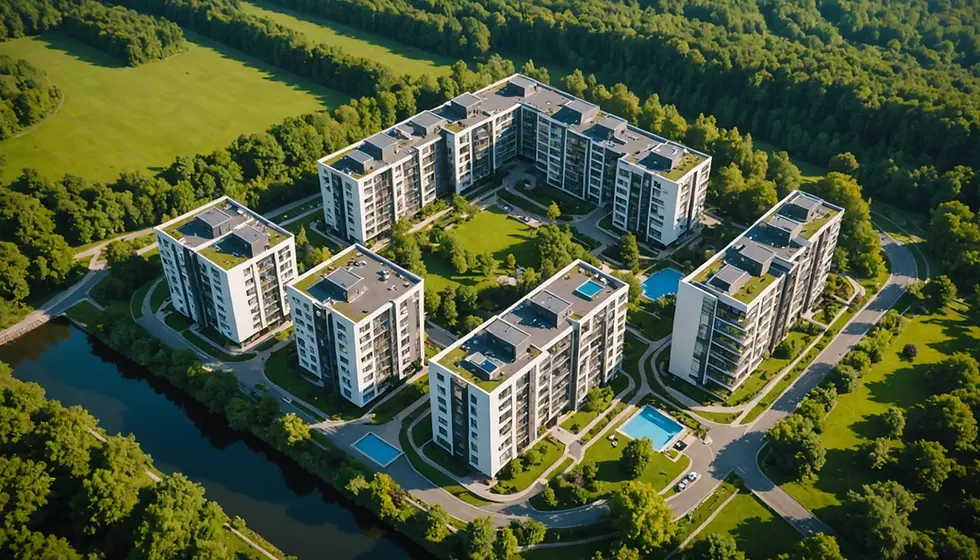Unveiling the Future: Navigating the Ever-Evolving Luxury Real Estate Market in 2025
- pk0563
- Feb 26, 2025
- 3 min read
The luxury real estate market is undergoing a significant transformation. Factors such as changing consumer preferences, technological advancements, and global economic shifts are playing a pivotal role. As we approach 2025, it is crucial for both buyers and sellers to grasp the trends that will shape this exclusive market. With a focus on sustainability, technology integration, and the influence of remote work, the luxury real estate landscape is set to become more sophisticated.
Understanding the Shift Toward Sustainability
A key trend in luxury real estate is the increasing focus on sustainability. High-net-worth individuals are not only seeking lavish properties; they want eco-friendly features that align with their values. Properties that offer energy-efficient designs and sustainable materials are expected to attract more interest.
For example, listings showcasing solar panels and smart home technology can see a price increase of up to 15% compared to similar properties without these features. Additionally, homes with energy-efficient appliances and rainwater harvesting systems not only appeal to eco-conscious buyers but can lead to significant long-term savings on utility bills. By 2025, homes that highlight their green credentials will be positioned to lead the market.

Technology: Shaping the Future of Luxury Living
The evolution of technology is transforming how luxury real estate is bought, sold, and experienced. In 2025, smart home features are expected to be standard in luxury properties. Buyers will look for homes equipped with advanced security systems, smart climate controls, and integrated entertainment options that enhance their lifestyle.
Virtual reality (VR) and augmented reality (AR) technologies will enable buyers to tour homes from anywhere in the world. This convenience can increase property sales by as much as 30%, as potential buyers have a wider reach and a more engaging experience. Real estate agents who adopt these tools will find themselves ahead in a competitive market.

The Rise of Remote Work and Its Impact on Luxury Preferences
The pandemic has permanently altered work habits, influencing luxury real estate preferences. In 2025, “live-work” homes will be increasingly popular, featuring dedicated office spaces within larger properties. Luxury buyers will seek homes that not only offer elegance but also accommodate their remote work needs.
For instance, properties located in peaceful natural settings, such as near mountains or beaches, will attract buyers looking for tranquility and functionality. This growing demand for peaceful environments indicates a need for real estate professionals to highlight spaces conducive to work and relaxation.
Market Dynamics: Global Expansion and Investment Opportunities
Global investment in luxury real estate is growing, particularly from emerging economies. By 2025, buyers from countries with rising economic conditions will seek luxury properties in established markets, diversifying their portfolios.
Opportunities will arise in secondary markets once considered less desirable. For example, cities in Eastern Europe or parts of South America may see increased demand for luxury listings as lifestyle preferences evolve. Investors should keep an eye on these regions, as they may offer competitive prices and the potential for substantial value appreciation.
The Role of Personalization in Property Transactions
As we move into 2025, personalization in luxury real estate transactions will continue to be vital. Buyers expect tailored experiences and dedicated service when exploring properties. Real estate agents need to adapt their strategies to engage clients on a personal level, creating a sense of value and attention.
By curating property selections that align with individual tastes and conducting comprehensive market analyses, agents can differentiate themselves in a competitive landscape. Providing insights that resonate with luxury buyers can significantly enhance the overall buying experience, making it more enjoyable and memorable.

The Importance of Location in Luxury Real Estate
Even with emerging trends in sustainability and technology, location remains a crucial factor in luxury real estate. By 2025, affluent buyers will prioritize properties in areas that offer a high quality of life. This includes access to outdoor spaces, cultural amenities, and vibrant communities.
Real estate professionals should focus on emphasizing the unique characteristics of each location. Highlighting nearby cultural attractions, recreational areas, and potential future developments can add significant value to properties and appeal to discerning buyers.
Embracing Change for a Successful Future
Navigating the luxury real estate market in 2025 presents both challenges and exciting opportunities. As trends in sustainability, technology, remote work, personalization, and location influence buyer preferences, stakeholders in the luxury sector must adapt to stay competitive.
Buyers equipped with this knowledge can make informed choices that align with their values and ambitions. For sellers and agents, understanding these trends will be crucial for effective marketing and meeting client expectations.
As we approach 2025, the luxury real estate market is set for significant transformation, promising a dynamic landscape for everyone involved. Embracing these changes will pave the way for a thriving future.


Comments